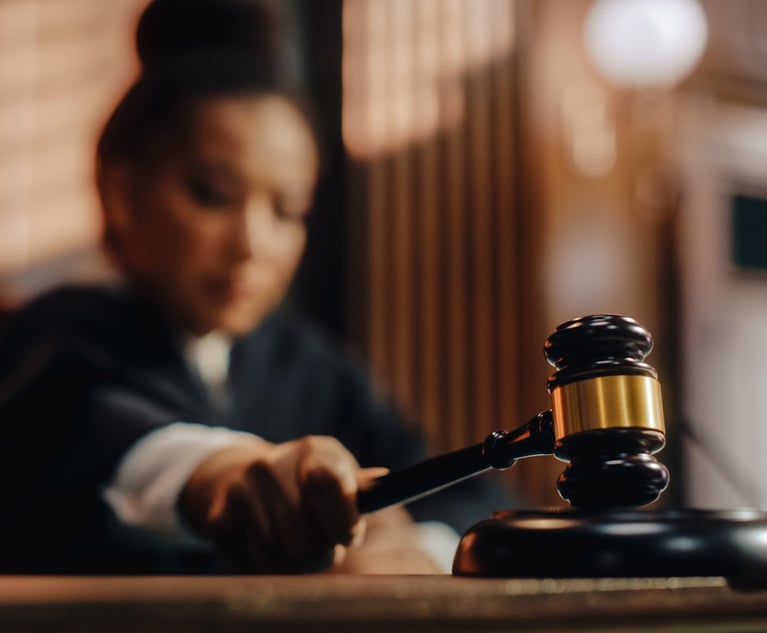Philadelphia Jury Renders $6M Verdict for Delayed Liver Cancer Diagnosis
A Philadelphia jury on March 6 awarded $6 million to the estate and wife of a 65-year-old man who died of liver cancer after his doctors disregarded two separate recommendations for MRIs by radiologists.
March 12, 2018 at 03:26 PM
5 minute read

A Philadelphia jury on March 6 awarded $6 million to the estate and wife of a 65-year-old man who died of liver cancer after his doctors disregarded two separate recommendations for MRIs by radiologists.
However, the exact portion of the verdict that is actually recoverable is unclear. Two of the three defendant doctors named on the verdict sheet settled for confidential amounts before trial, leaving only Dr. Eugene Choi, whom the jury found to be 32 percent liable. While that would typically leave Choi on the hook for $1.92 million, that's not necessarily the case here because the estate and Choi entered into a confidential high-low agreement just before the jury came back with the verdict.
The 12-member jury handed up the unanimous verdict in Garrett v. Mercy Health System after six days of trial and about two-and-a-half hours of deliberations in Philadelphia Court of Common Pleas Judge Michael Erdos' courtroom. The award comprised $1 million under the Survival Act and $5 million under the Wrongful Death Act. The jury found the two settling defendants, gastroenterologist Dr. Steven Lichtenstein and primary care physician Dr. Harvey Soifer, 38 percent and 30 percent liable, respectively.
According to the plaintiffs' pretrial memorandum, plaintiff Harry Garrett Jr. was diagnosed with hepatitis C and cirrhosis in 2007.
In 2009, Garrett became a patient of both Lichtenstein and Soifer. In November 2010, Garrett also became a patient of Choi, who specializes in hematology and oncology and began treating Garrett for anemia and other conditions. All three defendants were physicians with Mercy Health System, the plaintiffs' memorandum said.
In December 2010, Garrett underwent an ultrasound ordered by Soifer, after which the radiologist recommended an MRI of the liver, noting that it was a better method than ultrasound for detecting liver cancer, according to the plaintiffs' memorandum.
Between Dec. 8, 2010, and April 27, 2013, decedent met with the three doctors multiple times, but none of them ever ordered the recommended MRI, according to the plaintiffs' memorandum. On April 27, 2013, after Garrett was admitted to Mercy Fitzgerald Hospital with blood in his stool, he underwent a CT scan of his abdomen and pelvis to rule out gastrointestinal bleeding. The radiologist who performed the CT scan again recommended an MRI, but none of the defendant doctors ordered one.
In June 2014, the Lichtenstein ordered an ultrasound for screening, which did not show a mass, according to the plaintiffs' memorandum. But on Oct. 5, 2014, Garrett was admitted to the emergency room at Mercy Fitzgerald Hospital with severe abdominal pain. A CT scan was performed the same day, showing a suspected ruptured liver mass, which was confirmed by an enhanced MRI the following day. On Oct. 8, 2014, Garrett was deemed to be a poor candidate for surgery and a subsequent biopsy confirmed the mass had originated from liver cancer. Garrett died Nov. 9, 2014, at age 65.
The plaintiffs argued that the defendant doctors failed to timely diagnose Garrett's cancer because they disregarded the two prior MRI recommendations.
Choi, however, argued in his own pretrial memorandum that, prior to the MRI performed on Oct. 6, 2014, Garrett had undergone several other types of radiology studies, including the June 6, 2014, ultrasound, and none showed signs of hepatocellular carcinoma.
Choi also argued in his pretrial memorandum that Garrett had “outlived his life expectancy” based on his medical history, which, in addition to hepatitis C, cirrhosis and anemia, included thrombocytopenia, atrial fibrillation, diabetes and obstructive sleep apnea.
Counsel for Choi, Medford J. Brown III of Goldfein & Joseph in Philadelphia, said that despite the fact that the jurors heard testimony from two experts on each side, they deliberated only “very briefly” from about 11:10 a.m. to 1:30 p.m., during which time they were also given lunch.
“In my view, the award is a joke, actually,” Brown said. “The reason I say that is the decedent was 65 at the time of his death, had a very extensive medical history and there was expert testimony from the defense that he basically had lived out his life expectancy because of his numerous comorbidities.”
But when asked what he thought might have swayed the jury in his clients' favor, counsel for Garrett's wife and estate, Emmanuel O. Iheukwumere of the Emmanuel Law Firm in Philadelphia, said Choi's ”failure to act was pretty obvious” and that the defendant doctors ignored “clear-cut recommendations” by radiologists.
Iheukwumere tried the case with Fabio A. Sciarrino of his firm.
Counsel for Lichtenstein, Daniel Divis of Gerolamo Mcnulty Divis & Lewbart in Philadelphia, said he had no comment on the verdict because he and his client were not involved in the trial.
Counsel for Soifer, E. Chandler Hosmer of Marshall Dennehey Warner Coleman & Goggin in King of Prussia, could not be reached for comment.
This content has been archived. It is available through our partners, LexisNexis® and Bloomberg Law.
To view this content, please continue to their sites.
Not a Lexis Subscriber?
Subscribe Now
Not a Bloomberg Law Subscriber?
Subscribe Now
NOT FOR REPRINT
© 2025 ALM Global, LLC, All Rights Reserved. Request academic re-use from www.copyright.com. All other uses, submit a request to [email protected]. For more information visit Asset & Logo Licensing.
You Might Like
View All

'Discordant Dots': Why Phila. Zantac Judge Rejected Bid for His Recusal
3 minute read
Phila. Court System Pushed to Adapt as Justices Greenlight Changes to Pa.'s Civil Jury Selection Rules
5 minute read
Pa. Appeals Court: Trial Judge Dismissed Med Mal Claims Without Giving Plaintiffs Proper Time to Fight Back
4 minute readTrending Stories
- 1SEC Files Lawsuit Against Elon Musk Over Untimely Twitter Ownership Disclosure
- 2Survey Finds Majority of Legal Professionals Still Intimidated by AI Despite Need to Streamline Mounting Caseloads
- 3FTC Launches Inquiry of Single-Family Rental Home 'Mega Investors,' Issues PBM Report
- 4Womble Bond Dickinson's Wilmington Office Sees New Leadership as Merger Is Completed
- 5Defending Against a $290M Claim and Scoring a $116M Win in Del. Drug Patent Fight
Who Got The Work
J. Brugh Lower of Gibbons has entered an appearance for industrial equipment supplier Devco Corporation in a pending trademark infringement lawsuit. The suit, accusing the defendant of selling knock-off Graco products, was filed Dec. 18 in New Jersey District Court by Rivkin Radler on behalf of Graco Inc. and Graco Minnesota. The case, assigned to U.S. District Judge Zahid N. Quraishi, is 3:24-cv-11294, Graco Inc. et al v. Devco Corporation.
Who Got The Work
Rebecca Maller-Stein and Kent A. Yalowitz of Arnold & Porter Kaye Scholer have entered their appearances for Hanaco Venture Capital and its executives, Lior Prosor and David Frankel, in a pending securities lawsuit. The action, filed on Dec. 24 in New York Southern District Court by Zell, Aron & Co. on behalf of Goldeneye Advisors, accuses the defendants of negligently and fraudulently managing the plaintiff's $1 million investment. The case, assigned to U.S. District Judge Vernon S. Broderick, is 1:24-cv-09918, Goldeneye Advisors, LLC v. Hanaco Venture Capital, Ltd. et al.
Who Got The Work
Attorneys from A&O Shearman has stepped in as defense counsel for Toronto-Dominion Bank and other defendants in a pending securities class action. The suit, filed Dec. 11 in New York Southern District Court by Bleichmar Fonti & Auld, accuses the defendants of concealing the bank's 'pervasive' deficiencies in regards to its compliance with the Bank Secrecy Act and the quality of its anti-money laundering controls. The case, assigned to U.S. District Judge Arun Subramanian, is 1:24-cv-09445, Gonzalez v. The Toronto-Dominion Bank et al.
Who Got The Work
Crown Castle International, a Pennsylvania company providing shared communications infrastructure, has turned to Luke D. Wolf of Gordon Rees Scully Mansukhani to fend off a pending breach-of-contract lawsuit. The court action, filed Nov. 25 in Michigan Eastern District Court by Hooper Hathaway PC on behalf of The Town Residences LLC, accuses Crown Castle of failing to transfer approximately $30,000 in utility payments from T-Mobile in breach of a roof-top lease and assignment agreement. The case, assigned to U.S. District Judge Susan K. Declercq, is 2:24-cv-13131, The Town Residences LLC v. T-Mobile US, Inc. et al.
Who Got The Work
Wilfred P. Coronato and Daniel M. Schwartz of McCarter & English have stepped in as defense counsel to Electrolux Home Products Inc. in a pending product liability lawsuit. The court action, filed Nov. 26 in New York Eastern District Court by Poulos Lopiccolo PC and Nagel Rice LLP on behalf of David Stern, alleges that the defendant's refrigerators’ drawers and shelving repeatedly break and fall apart within months after purchase. The case, assigned to U.S. District Judge Joan M. Azrack, is 2:24-cv-08204, Stern v. Electrolux Home Products, Inc.
Featured Firms
Law Offices of Gary Martin Hays & Associates, P.C.
(470) 294-1674
Law Offices of Mark E. Salomone
(857) 444-6468
Smith & Hassler
(713) 739-1250





